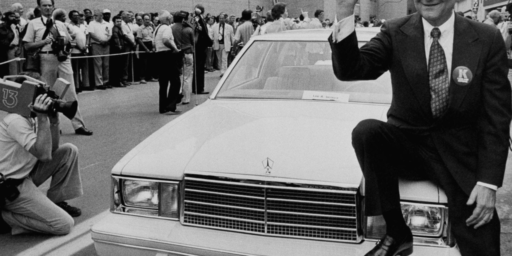Toyota Won’t Raise Prices to Bail Out U.S. Competitors
Toyota won’t raise prices to aid U.S. car sector (Reuters)
Toyota Motor Corp. said Tuesday it will not raise its car prices to help U.S. rivals, breaking with its chairman’s comments a day earlier that voluntary price increases and other steps were in order to help restore health to the U.S. auto industry. “Our basic stance is that prices are something for the market to determine,” a spokesman at Japan’s top auto manufacturer said. “We are not thinking about changing (vehicle) prices in order to help the U.S. auto industry.”
Japanese brands collectively grabbed a record 30 percent share of the U.S. auto market last year, and some executives have become more sensitive about how their companies’ success would play out at the political level.
At the annual motor show in Detroit earlier this year, Toyota President Fujio Cho and Honda Motor Co. Chief Executive Takeo Fukui said Japanese brands’ expansion in the United States should not go unchecked, with Fukui volunteering that the combined share should be kept under 40 percent. “I’m worried not only about GM but about the entire U.S. auto industry,” Toyota Chairman Hiroshi Okuda told a news conference Monday as the head of Japan’s biggest business lobby, the Japan Business Federation. “Automobiles are the symbol of American industry, and if things go wrong there may be some kind of impact. “As an automaker, we have to think about what countermeasures we can take,” Okuda said, adding that technical alliances and voluntary price rises are possibilities.
The very idea that companies would raise prices so as to help out their less efficient competitors is mind boggling. One of the few major disagreements I had with President Ronald Reagan was his policy of putting restrictions on the Japanese auto manufacturers (and other industries) to protect bloated domestic firms. While I’ve got some sympathy for protectionism to combat illegal state subsidies abroad, it’s outrageous to do it in cases where it’s a case of bloated companies being challenged by more efficient and innovative competitors.
General Motors has been a behemoth in the world auto market for decades. If they haven’t figured out how to make cars that Americans want by now, the hell with them. Toyota and Honda can buy their plants and start manufacturing desirable cars almost immediately.
Initially, the Japanese firms had an edge because the fuel price shocks of the 1970s spurred Americans to buy tiny economy cars that Detroit had little experience making. But Detroit compounded their disadvantage by refusing for more than a decade to seriously make a shift in that direction. When fuel prices quit being a major concern and Americans shifted toward buying cars with powerful engines, pickup trucks, and sport-utility vehicles, American firms once again had a huge advantage. They allowed the Japanese firms to catch up to them and even surpass them in short order. Why Toyota should bail them out is unclear.






Detroit needs a good lesson in economics. It has been in the wind for over 20 years now, that the beancounters have no place in management of companies. If Detroit would learn the lessons of the likes of Henry Ford, they would not be in the position thay are in. In short, Management needs to manage their companies instead of managing their stock prices. The short term high profit days are finally over and long term planning and management is the only way to recovery. I own a 1997 chev pick up and the cost of ownership for the first 5 years was over $ 4000.00 per year. I will drive it untill the wheels fall off before I purchase a new one. Just tell me why a plastic car costs $ 25,000.00. Only damned fools would buy one.
For once, I agree with the Japanese, Bad Management should Not be subsidized.
Toyota in the US is as much a domestic brand as some of the big 3. They make their minivans in Kentucky, Tundra pickups in Indiana. My Corolla came from Ontario, Canada. This isn’t a US – Japan issue, it’s a GM – Toyota issue. GM is in deep doo doo with its big pension liability. I don’t know how they’ll ever get out from under that without hurting a lot of its retirees or else it will eventually go bankrupt.
Who needs Toyota to bail them out? We’ve got a federal government just a-waiting to take over paying for the pensions and health care of socialistically-inclined union members.
Who’s saying Toyota cars are underpriced? Looked at a Toyota minivan lately? their prices are higher than the detroit entrants. The Camry is comparably priced to a mid-sized Detroit model. Ditto Honda.
The real low price market belongs to Kia, which still has a sub-$10,000 mid-size sedan.
If Detroit wants to compete with Toyota, get them to make cars that get decent gas mileage and have a record of running into the 200,000 mile zone.
As well, you probably won’t hear ford bitching too much, because they own Volvo, Mazda and Land Rover, all of which have decent sales.
Didn’t shift in that direction?
Let’s think about this.
Chevette
Vega
Pinto
K car
Mustang II
About toyota and honda minivan prices vs. the Detroit vans. Try to price the vehicles with similar features and options. Go to Edmunds and try that out, you’ll see that the Honda and probably the Toyota will be less if you factor in all the bells and whistles most people want. Sure you can get a stripped vehicle for cheap, but how many of those will you find on the dealer lot? Most dealers I know stock cars that are loaded with options that I don’t want nor care to pay for. When I bought my Odyssey in 1999 the MSRP was $24k, and that’s what I paid with all the features I wanted. I went to Dodge and a similarly featured Caravan would have cost me close to $30k. I like that Honda sells their cars with little or no options, other than determining what trim level you like (LX, EX).
Bithead,
James said “…seriously make a shift in that direction.” By that I think he meant with cars that could compete head to head in quality and performance against the Toyotas, Datsuns and Hondas of the day. I don’t think the Chevette, Vega, or any of those cars could pass that test. Frankly, most of them were pieces of junk slapped together as an afterthought with leftovers in the parts bin and old designs gathering dust on the R&D office shelf.
I agree it’s not a Japan v. USA thing, it’s a quality and price thing. My new Nissan Frontier pickup costs $17,000. I got a $1500 rebate. It has basic options, such as a CD player. It was made in Smyrna, Tennessee. That plant is the most efficient auto plant in the country. It produces a Frontier truck in 15 hours. It is also non-union, and has turned down the union more than once. GM had better see the future. That new Toyota Tundra plant is going up in Texas, another Right to Work State. The writing is on the wall.